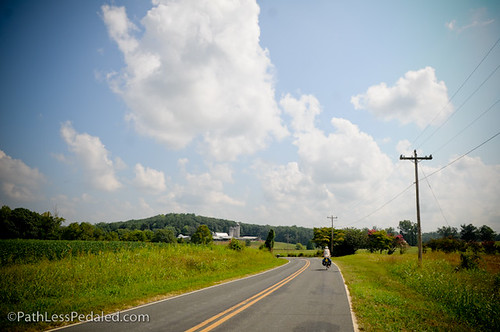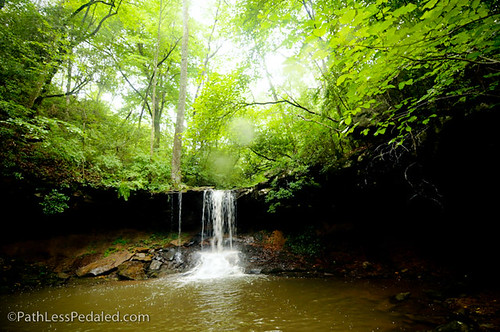Embracing Serendipity
We’re leaving Winston-Salem, headed toward Greensboro. There’s a bike shop that we’ve heard about that we want to check out, and a brewery in town that everyone says is fantastic. We have no idea where we’re going to wind up that night.
On our way through downtown Winston-Salem, we stumble into a local coffee shop. There’s a beautiful cargo bike parked outside, outfitted as a coffee delivery bike. Russ takes photos. We order coffee and bagels and get to talking with a few other people. It turns out that they’ve recently started their own company building bike frames, and they want to work on some touring-specific frames and bike-packing gear. A storefront is in their future. We mention that we’re headed to Greensboro that night, do they happen to know anyone who would let us crash at their place for the night? Yes, actually, they have a friend, they’ll call her for us. We ride into Greensboro, a beautiful ride, with a stop for burgers and ice cream. The friend calls, she’s happy to host us for the night. We visit the bike shop and the brewery that called us to town in the first place, then meet our host for the night. We sit up chatting, and she and Russ bond over a love of fly fishing. In the morning, she rides us part of the way out of town, and we head through the countryside to meet our next hosts, a couple who we just heard from via email the night before.
So goes our trip, from day to day, week to week. We pedal down the road, enjoying the scenery, stopping to eat at local diners, chatting with folks, telling our story, learning to trust that we’ll find a place to sleep at night.

The more we travel, the more we have learned to welcome and embrace serendipity, and to trust in serendipitous meetings. Serendipity allows us to meet people we never could have conceived of meeting, see places we didn’t know existed, experience the kindness of strangers, try something new and delightful.
Yet, serendipity isn’t really something you can plan or look for. By definition, serendipity is: “the faculty or phenomenon of finding valuable or agreeable things not sought for.” You have to just be open to its gifts and allow it to show up.
And this is where serendipity becomes difficult, because this idea of not planning and just being open to “whatever comes along” is hard to grasp and even harder to master. But we’re trying.
The longer we’re on the road, the less we plan. We ride down the road with a rough idea of where we’re headed, but we purposefully don’t lock ourselves into any decisions about where we’ll end up. We’ll look at a map in the morning and pick a campground to aim for, but we never know if that’s actually where we’ll stay the night.
When we tell people that we don’t plan, we’re always met with a look that’s a mix of awe and horror. It’s as if the person we’re talking with can appreciate how great this could be, but can’t envision actually doing it for themselves. “Aren’t you afraid it won’t work out?” “What if you don’t find a place to sleep at night?”

Here’s a secret: I used to be a huge, hard-core planner. I used to plan our trips and vacations down to the last little detail, and I would derive a lot of enjoyment from the planning process. Except that, eventually, my penchant for planning became a liability. We would travel somewhere and I would plan where we would go and have an idea in my head of what it would be like – and, then, if something else came along, no matter how great that something else could be, if we didn’t follow my plan, I would feel let down. I would mope around and whine and get frustrated and feel totally out of control.
One day, I realized how completely ridiculous I was acting, and how much I was keeping myself from experiencing. From then on, I decided to learn how to release control over the outcome. This is a crazy hard lesson, but absolutely worth it. What I discovered is that, if I didn’t have a preconceived idea of what a day would look like, I could be completely happy with whatever came along.
How did I do it? I recognized that it’s in my nature to plan, and I found a new way to channel that energy. There’s a train of logic that says that you can’t actually break a habit, you have to change the habit. Instead of planning exactly where we’ll camp on a given night, I’ll scour the entire map and mark down where ALL of the potential campgrounds are located. Then, I can relax into the knowledge that there are plenty of places for us to sleep at night, and I can simply enjoy my day. Instead of trying to control the day, I try to control my reactions.
It’s been an interesting experience to train ourselves to be open to not knowing what will happen. I think it’s a continual process, and we have to be very aware of our reactions and check ourselves on occasion. But, the reward for all of this hard work is priceless. If we had stuck to our plan of logging lots of miles instead of accepting a home-stay offer and stopping in Sewanee for the night, we never would have been able to hike down to a hidden waterfall. If we had panicked about not having a place to stay our second night in Chapel Hill, instead of putting out feelers and trusting it would all work out, we might never have been able to eat venison for the first time and meet a kindred spirit. These sorts of experiences are why we’re on this trip, so it would be a shame to let anything get in the way.

Tags In
8 Comments
Leave a Reply to Scott
This site uses Akismet to reduce spam. Learn how your comment data is processed.
Subscribe
Patreon
Join Team Supple on Patreon
PayPal

I’m so happy you were able to hook up with Jeremy and Hannah! I think you all have a lot in common 🙂
It’s cool that you got to stay in the Sienna Hotel, too. That’s where I had my wedding reception, a beautiful place.
Fun to see my home state through your travelogue.
when i grow up, i want to be just like the two of you. i pray you peace, love and an abundance of beautiful people on the path of your journey!
Serendipity might be a skill, rather than a default. Rather than a decision in favor of, you may have embraced, and so developed and acquired the ability to create the conditions of serendipity. In this sense, you would be exhibiting a higher level of control and planning.
Oh my….this is the best lesson. I need to learn how to do this in my own life….to embrace the unexpected. What a beautiful post, Laura.
Great posting and what a journey. Sorry to have missed meeting you in W-Salem. Maybe next time – ! Safe travels to you both,
Jim B.
I’m so sorry I missed your stop through Greensboro where I live. I was following your blog for a while but then stopped for a spell when my old laptop crashed. So I missed your posts when you toured North Cackalacki. Drats! Well, hope enjoyed your visit to the South!
[…] Laura in your post Embracing Serendipity you speak to how hard it was to go from being a hard-core planner of every detail of the trip, to […]
The Thru-Hikers who backpack the Appalachian Trail have a name for all the wonderful, serendipitous events that they encounter – they call it Trail Magic, but it’s not magic at all, it is quite real. Once experienced fully it’s never forgotten and always sought after, but the “magic” is not something that can be taught or forced, it is entirely a giving up process. Laura describes the practice accurately – “release control over the outcome” and instead look for options and the potential they contain. It is the very essence of an optimistic outlook and the reward is huge coming in the forms of trust and discovery……